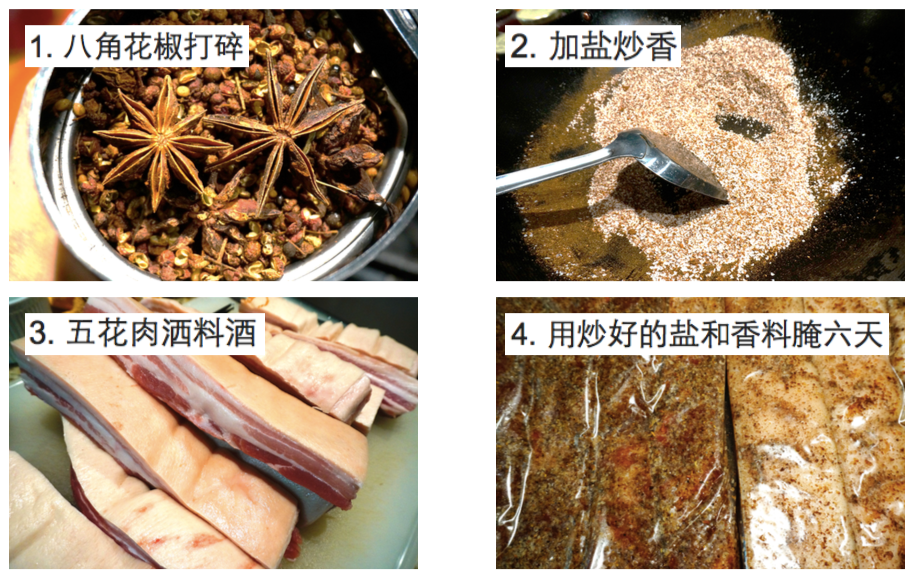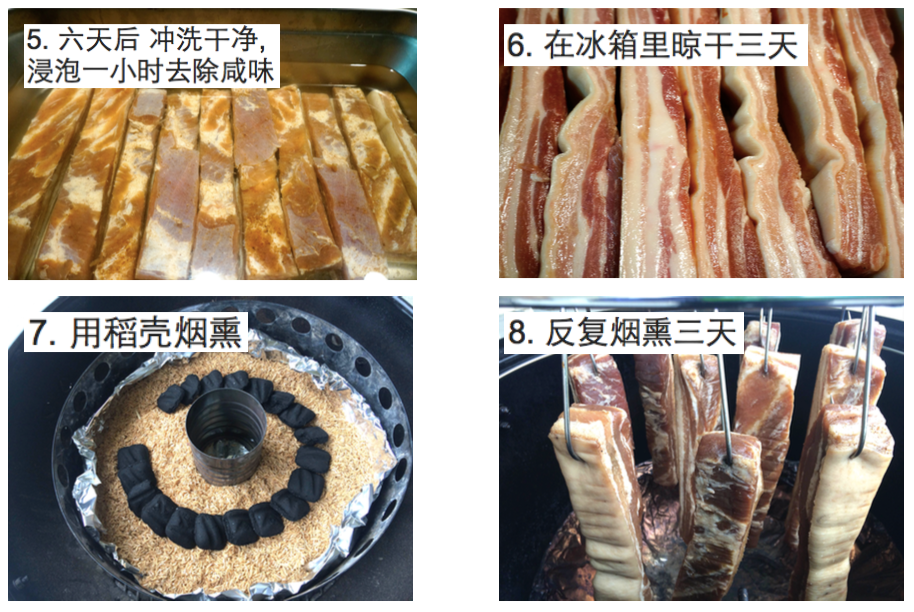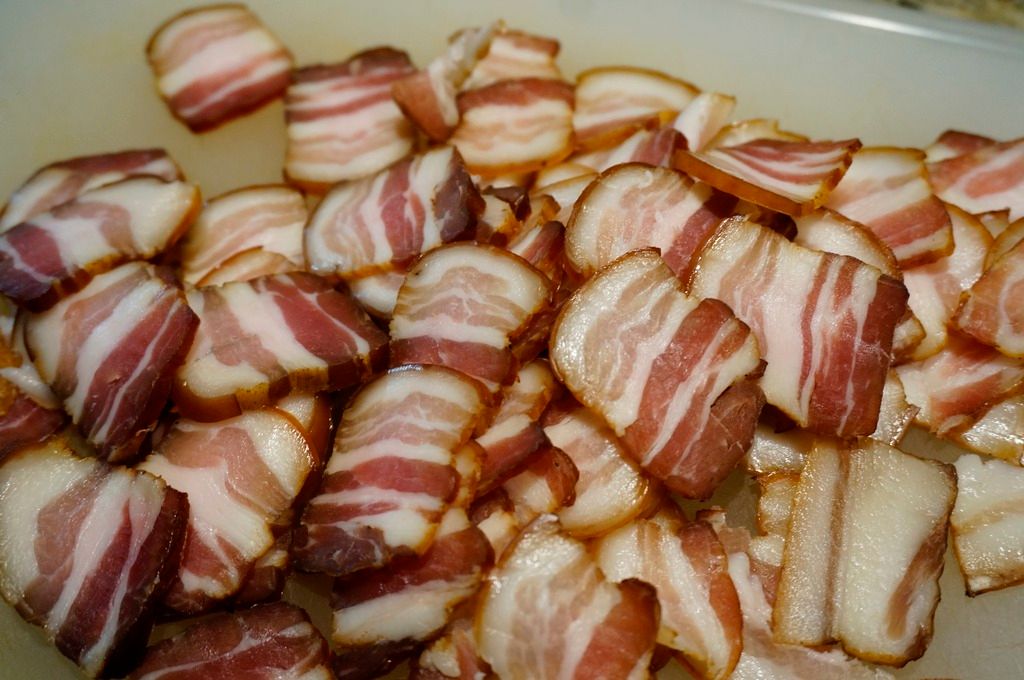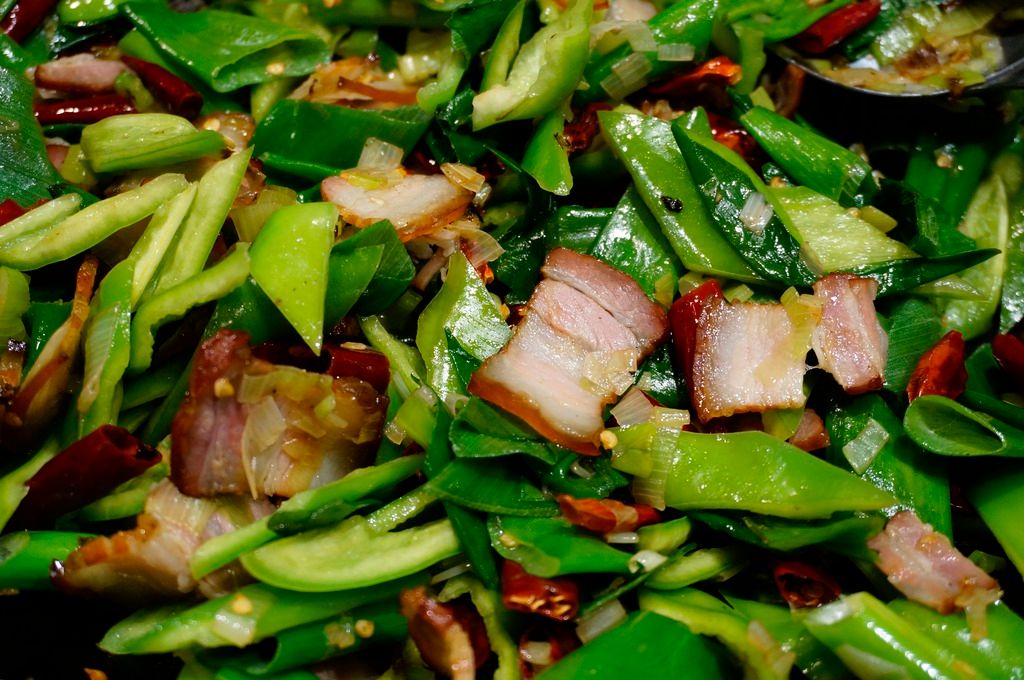YYang
TVWBB Fan
For my parents' Christmas gift this year, I decided to make a version of bacon originating from my paternal grandparents' home province of Hunan, China. There are a lot of parallels between the processes of making Hunan bacon and American bacon, but the taste and application of the final product are quite different. Traditionally, it's made toward the end of the year when the weather turns cold, so that all steps from beginning to end can be done safely without refrigeration.
Steps (see corresponding photos below with optional simplified Chinese captions):
1. Grind up star anise and Szechuan peppercorn to a fine powder.
2. Toast spices along with kosher salt in a wok until fragrant. There's no need for exact measurements. The meat doesn't seem to absorb much of the pungent spice flavors, so it's OK to be aggressive with the spices.
3. Sprinkle Shaoxing cooking wine over strips of skin-on pork belly and rub in evenly.
4. Coat belly pieces liberally with the spice/salt rub and let dry-brine in a plastic bag for six days in fridge, flipping each day.

5. After six days of brining, thoroughly rinse off all the salt and spices, and soak in cold water for an hour to tone down the saltiness.
6. Place on a rack and let air-dry for three days in the fridge. Traditionally, the strips are hung outdoors to dry in the cool winter air. Since I share my backyard with the occasional raccoon, I opted to go with modern convenience.
7. Once the pellicle is formed, the meat is cold-smoked using rice hulls. I tried using the snake method, but something about the way rice hulls combust makes the snake extinguish itself more easily. I had to keep jostling the coals and rearranging the hulls to get a continuous stream of smoke . There is also no "thin blue" smoke to be had - it burns thick and white.
. There is also no "thin blue" smoke to be had - it burns thick and white.
8. Smoke 12 hours a day for 3 days straight. This sounds crazy, but it's a typical length of time. It's cold enough outside that I don't have to worry about spoilage. Because the meat is dried to the point where it's stiff on the outside, the bacon doesn't take on much color, but with all the rice hull smoke, it takes on a distinctively strong fragrance that can't be replicated with the usual smoke woods used for barbecue.

Since Hunan bacon is so salty, it's rarely eaten by itself like American bacon. Instead, it's used almost as a seasoning - its salt content will season up any dish. Another difference is that the fat is NOT supposed to be rendered too much. The smoky fat is actually thought of as one of the best parts.
One of the most common ways to prepare it is to slice thinly and stir fry it with Chinese leeks and various chile peppers. Some people steam the whole strip of bacon first, and then slice and stir fry, or they might slice first, blanch the slices, and then stir fry. I find that these methods dull the smoke flavor too much, so I like to slice and stir fry directly.
Here are the slices:

And here's the finished dish with Chinese leeks, Anaheim peppers and dried Hunan chiles. Serve with plenty of rice.

Thanks for taking a look
Steps (see corresponding photos below with optional simplified Chinese captions):
1. Grind up star anise and Szechuan peppercorn to a fine powder.
2. Toast spices along with kosher salt in a wok until fragrant. There's no need for exact measurements. The meat doesn't seem to absorb much of the pungent spice flavors, so it's OK to be aggressive with the spices.
3. Sprinkle Shaoxing cooking wine over strips of skin-on pork belly and rub in evenly.
4. Coat belly pieces liberally with the spice/salt rub and let dry-brine in a plastic bag for six days in fridge, flipping each day.

5. After six days of brining, thoroughly rinse off all the salt and spices, and soak in cold water for an hour to tone down the saltiness.
6. Place on a rack and let air-dry for three days in the fridge. Traditionally, the strips are hung outdoors to dry in the cool winter air. Since I share my backyard with the occasional raccoon, I opted to go with modern convenience.
7. Once the pellicle is formed, the meat is cold-smoked using rice hulls. I tried using the snake method, but something about the way rice hulls combust makes the snake extinguish itself more easily. I had to keep jostling the coals and rearranging the hulls to get a continuous stream of smoke
8. Smoke 12 hours a day for 3 days straight. This sounds crazy, but it's a typical length of time. It's cold enough outside that I don't have to worry about spoilage. Because the meat is dried to the point where it's stiff on the outside, the bacon doesn't take on much color, but with all the rice hull smoke, it takes on a distinctively strong fragrance that can't be replicated with the usual smoke woods used for barbecue.

Since Hunan bacon is so salty, it's rarely eaten by itself like American bacon. Instead, it's used almost as a seasoning - its salt content will season up any dish. Another difference is that the fat is NOT supposed to be rendered too much. The smoky fat is actually thought of as one of the best parts.
One of the most common ways to prepare it is to slice thinly and stir fry it with Chinese leeks and various chile peppers. Some people steam the whole strip of bacon first, and then slice and stir fry, or they might slice first, blanch the slices, and then stir fry. I find that these methods dull the smoke flavor too much, so I like to slice and stir fry directly.
Here are the slices:

And here's the finished dish with Chinese leeks, Anaheim peppers and dried Hunan chiles. Serve with plenty of rice.

Thanks for taking a look
Last edited:
